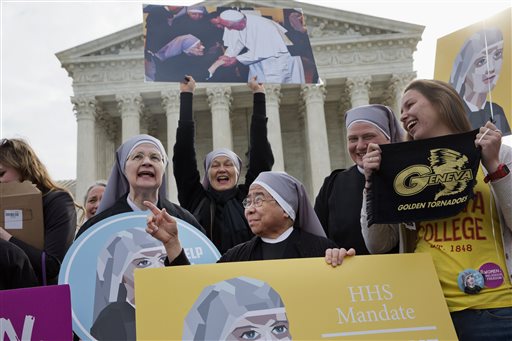In this per curiam decision in Zubik v. Burwell (2016), the U.S. Supreme Court vacated judgments from four federal courts of appeals – the Third, Fifth, Tenth, and D.C. Circuits – that had found that federal regulations requiring employers to provide contraception coverage to their employees did not violate non-profit religious organization-employers’ religious liberty rights under the Religious Freedom Restoration Act of 1993 (RFRA).
Zubik case watched closely because of decision in Burwell v. Hobby Lobby
The litigation occurred in the wake of the Supreme Court’s more noteworthy decision – Burwell v. Hobby Lobby (2014) in which a sharply divided Court had ruled that closely held, for-profit corporations with a sincere religious objection to contraception coverage for their employees could opt out of the contraception mandate from the Affordable Health Care Act.
After the 2014 decision, the attempted accommodation was that such closely held corporations would have to send a notice to the federal government, stating its religious-based objections so that it could be exempt from the requirement.
Religious organizations objected to method of opting out of contraception coverage under Obamacare
The organizations – East Texas Baptist University, Geneva College, Little Sisters of the Poor Home for the Aged, and Priests for Life – had contended that even forcing them to submit a notice of objection to their insurance carriers to discontinue coverage for contraception constituted a substantial burden of their religious liberty rights.
The U.S. Supreme Court consolidated these cases. After oral argument, the Court requested supplemental briefing from the parties on the following question: “whether contraceptive coverage could be provided to petitioners’ employees, through petitioners’ insurance companies, without any such notice from petitioners.”
Both the petitioners and the government confirmed that such an option was available. Petitioners then clarified that their religious-liberty rights were not violated when they “need to do nothing more than contract for a plan that does not include coverage for some or all forms of contraception,” even if their employees receive cost-free contraception coverage from the same insurance company.
Supreme Court vacates, remands Zubik so parties can work out disputes
The Supreme Court stated that in light of this clarification, the cases would be vacated, remanded, and the parties could work out any remaining areas of dispute.
The Court explained: “The Court expresses no views on the merits of the cases. In particular, the Court does not decide whether petitioners’ religious exercise has been substantially burdened, whether the Government has a compelling interest, or whether the current regulations are the least restrictive means of serving that interest.”
Justice Sonia Sotomayor authored a concurring opinion, joined by Justice Ruth Bader Ginsburg.
Sotomayor indicated she joined the opinion “because it allows the lower courts to consider only whether existing or modified regulations could provide seamless contraceptive coverage to petitioners’ employees … without any notice from petitioners.”

